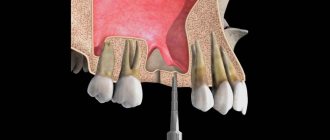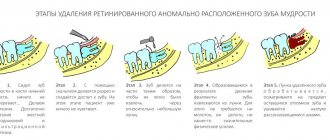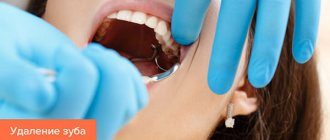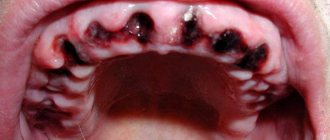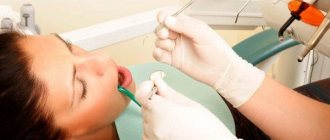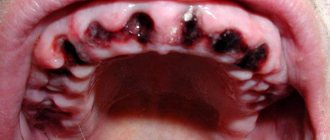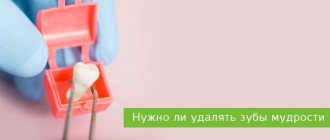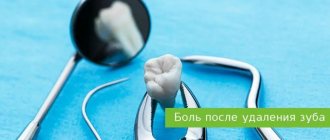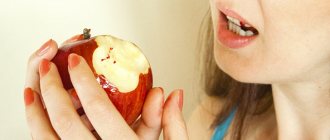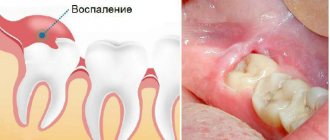Many people have to face the procedure of tooth extraction. Quite often, patients experience discomfort after removal. Unfortunately, eliminating pain does not mean complete recovery. Even if the tooth extraction was performed by an experienced specialist, after such a procedure it is imperative to follow all the doctor’s recommendations. First of all, this applies to full oral care. In addition, you need to monitor your diet. After the tooth extraction procedure, you should definitely check with your doctor how long you need to abstain from eating. Depending on the complexity of the removal, the specialist will suggest a specific time frame.
Why can’t you eat after removal?
This recommendation is due to the fact that very rough food can have a traumatic effect on fresh blood clots that form in the socket after tooth extraction. Clots in the hole are needed to protect the removal site from pieces of food getting into it. If the patient neglects the recommendation regarding how much not to eat after tooth extraction, then food debris may get into the wound. This increases the risk of bleeding and inflammation. Also, failure to comply with this instruction can lead to the development of a cyst, which is a serious complication after tooth extraction. To avoid hunger, experts allow patients to drink liquids, such as drinking yoghurt or kefir. You should eat food after tooth extraction very carefully, and you must follow the time interval recommended by the specialist.
How long after tooth extraction do these restrictions apply?
A patient at a dental clinic should remember about dietary habits for 3-5 days. If the extraction was difficult, the gum tissue is severely damaged, or there are problems with the formation of a dense blood clot in the socket, a second medical consultation will be required.
If there are postoperative complications, you will have to follow a special gentle diet for at least a week. In advanced cases, restrictions can last up to one month.
It is very important to remember your dentist’s dietary instructions and follow them strictly. Only then can you be sure of problem-free rehabilitation.
Hot meals
During the first 24 hours after tooth extraction surgery, you should not eat hot foods. This is due to the fact that increased temperature can cause vasodilation, which in turn will lead to an increase in blood flow. This situation can provoke the development of recurrent bleeding. Because of this, patients are also prohibited from visiting baths and saunas after removal. If a person neglects this prescription and does not think about the question of how long after surgery he can return to his usual diet, then there is a high risk of developing all kinds of complications. Recommendations for nutrition after tooth extraction are in most cases individual and depend on the specific situation. For some, doctors allow them to eat any food without restrictions just a few hours after the procedure. However, most often you need to wait a little longer.
When can you drink
When asking a specialist how long after tooth extraction you can eat, most patients are also interested in the question of taking liquids. There are no contraindications to clean water, and you can drink it immediately after surgery. However, experts do not recommend rinsing the mouth. This is due to the fact that using liquid from the hole can wash out a blood clot, and this can provoke the development of complications. Experts advise drinking only boiled water, which should not be hot.
Eating food
The period of time during which you cannot eat after tooth extraction depends on the individual characteristics of the patient and the complexity of the operation performed. Most often, a couple of hours after removal, specialists allow you to eat something liquid. Dairy products, such as yogurt or kefir, are good for this. Thanks to such food, the body will quickly be satisfied, and the site of tooth extraction will not be damaged. During your first meal, you should not eat chips, crackers or deep-fried meat. Such hard food will greatly damage the cavity.
Can I drink beer?
The same rules apply to beer as to other alcoholic beverages. Even though the concentration of ethyl alcohol in beer is lower than in other drinks, its consumption can cause more serious harm. The fact is that any beer contains yeast, which promotes the spread of pathogens and is an excellent breeding ground for unicellular fungi. In patients who cannot stop drinking beer after tooth extraction, the risk of stomatitis, alveolitis and other inflammatory processes will be almost four times higher than those who follow the regimen prescribed by the doctor.
After tooth extraction, you should not even drink non-alcoholic beer.
Removing any tooth is a complex, painful and unpleasant procedure, after which the patient requires a serious recovery period and a special diet and hygienic care. In order not to create additional stress on the injured gum and to avoid inflammation, it is necessary to avoid eating for 2-3 hours after surgery. A person will be able to return to their usual diet after the wound has completely healed, and postoperative complications will be excluded.
After difficult removal
Such removal is carried out when the dental roots are incorrectly located, on unerupted dental units or in the absence of the crown part of the tooth. Also, more complex surgical procedures may be required if the wisdom tooth is located too far away or a cyst has formed next to it. Late erupted wisdom teeth most often create many problems. Basically they grow incorrectly. The formation of a cyst is a bubble filled with cells and bacteria. And if the cyst is not removed on time, this can lead to the development of serious consequences. After such manipulations, sutures are placed at the removal site. The healing period of the gums after complex tooth extraction may vary in each specific case. If the specialist has not stated, then you should definitely clarify how long after the procedure you can start eating. It is also necessary to take into account the fact that when stitches are applied, they will have to be removed after some time. But with sutures, the socket is more reliably protected. However, even in this situation, you should refrain from eating hot, salty or spicy foods immediately after the removal procedure.
How can you rinse your mouth after wisdom tooth removal?
No frills are needed here: a regular warm saline solution is suitable for rinsing. Simply dissolve half a teaspoon of salt in a cup of water. Do not buy mouthwashes in the store: they contain substances that will irritate the wound.
The doctor may also give other recommendations after wisdom tooth removal:
- In the first three days, you cannot keep your head below the level of your heart. You cannot lie down so that your head is at the same level as your body. You need to sleep in a half-sitting position. Otherwise, the flow of blood to the head will increase bleeding from the wound.
- Do not drink through a straw, do not spit, do not whistle, or blow on hot food. All of this can cause the blood clot that has formed at the site of the extracted tooth to dislodge, causing a condition known as dry socket. At the same time, healing slows down and an unpleasant odor occurs.
- In the first 24 hours, you can apply ice or a towel soaked in cool water to your face. This will help reduce bleeding and swelling of the face.
- Avoid physical activity. Do not lift heavy bags. This may cause the blood clot to fall out of the socket.
What is allowed to eat
One day after the operation, you can eat soft and warm food. It is recommended not to consume fried, spicy and salty foods. This is because such dishes can lead to injury to the socket or irritation of the gums. The temperature of the food consumed should not be high. Recommended drinks to drink:
- dairy products;
- compotes;
- natural juices;
- still mineral water.
It is better to hold off on drinking hot coffee, tea or very cold drinks with ice.
Soft food
If you answer the question of how long after tooth extraction you can start eating, then you can eat food either on the day of the operation or on the next day. However, it should be remembered that food must be soft at first. In order for the healing period to pass comfortably and quickly, experts recommend consuming soups, liquid cereals, purees, as well as foods enriched with vitamins in the first 2-3 days. The diet should include fruits, but preference should be given only to those with soft flesh. These are peaches, bananas, seedless berries, melon, apricots and persimmons. But it is better to refrain from citrus fruits such as oranges, lemons, kiwi, pomegranate and others. The large amount of acid contained in them has a negative effect on irritated gums.
How long does pain last after tooth extraction?
During the removal procedure, the tissue that surrounded the tooth is injured and the gums become inflamed. Due to the effect of anesthesia, the patient does not feel pain immediately after removal. But after a couple of hours, pain may occur. Over time, the pain becomes less and less. The duration of pain depends on numerous factors:
- The patient takes medications prescribed by the doctor to speed up healing.
- Complexity of the procedure.
- Strict compliance with all instructions and recommendations of a specialist.
After a complex removal, pain can spread not only to the gums, but also to the cheek, as well as to neighboring teeth. The healing process after such manipulation will take a little longer. Swelling after tooth extraction usually goes away within a couple of days. If, several days after the procedure, swelling and pain do not go away, then this may be a symptom of the development of complications. In such a situation, you must immediately seek the help of a specialist. In our 3D dental clinic "NovaDent" all surgical procedures are performed using high-quality modern anesthesia. The consultation is conducted by experienced, qualified dental surgeons who remove teeth as carefully as possible. We try to create comfortable living conditions for our patients, and do everything possible to minimize the risks of complications after removal. By making an appointment with our dentistry, you will receive a detailed consultation, be able to undergo highly accurate diagnostics, and also receive high-quality dental services using modern equipment using reliable materials. Sign up right now on our website using the registration form or call the administrators, who will be happy to find a convenient appointment time for you - we work seven days a week and weekends. Phone number to make an appointment with our specialists. Trust your health only to professionals!
Antibiotics and other drugs after wisdom tooth removal
Antibacterial drugs are prescribed only in cases where there has been an infection in the oral cavity or after an intervention there is a high risk of infection.
You can numb a wisdom tooth after removal with regular painkillers, such as ibuprofen. But don't rush to take the pill. Sometimes an ice pack helps relieve pain. If you still cannot do without medication, you can start with half a tablet.
If, even after taking the full dose indicated in the annotation, the pain does not go away for a long time and increases, you should consult a doctor: perhaps he will prescribe stronger drugs.
